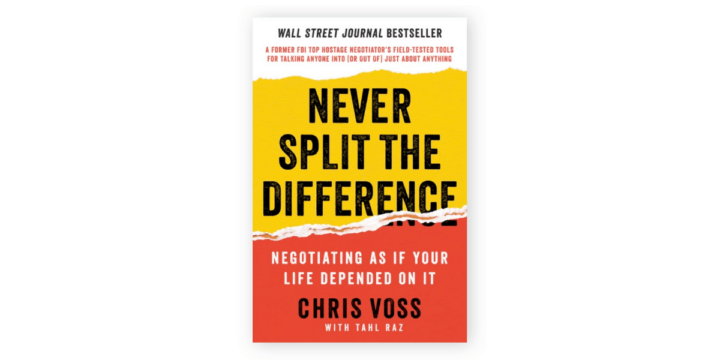Book Recommendation: Never Split the Difference
I have more than 40 books on negotiating, so I wasn’t expecting to learn too much when I picked up a copy of Never Split the Difference: Negotiating As If Your Life Depended on It, by Chris Voss. I was wrong. Never Split is one of the best negotiating books I’ve read in a long time.
Why? Because it covers the emotional, non-rational side of negotiating more deeply and more realistically than any of the others, and Voss provides eminently practical ideas and techniques that ring true. As a former hostage negotiator with the FBI, Voss brings a different background and skillset to the table than the usual academic, businessman or sports agent.
By their very nature, hostage negotiations are probably going to contain more intense emotions than the typical business deal, but that doesn’t change the fact that the personal element is always a huge factor lurking under the surface. Even the most sophisticated and jaded business negotiator has feelings and fears and ego and personal desires which get in the way of strictly commercial considerations.
There is a great line in the book which every negotiator should remember: feeling is a form of thinking. A negotiator who enters a negotiation armed only with reason and pure intellect is like a fighter with one hand tied behind their back. For example, your rigorous economic analysis may help you prove your offer is fair, but your “irrational” counterpart may still find it insulting and throw it back in your face.
Voss exposes the biases and quirks that lie just under the surface, and recommends practical and sometimes surprising techniques to take advantage of them. Everyone will find their own which resonate with them, but let me share two of my favorite here. (There are others, but I’ll keep them to myself in case a potential future client is reading this.)
Use calibrated questions. Calibrated questions are open-ended questions that are calibrated for a specific effect. For example, when your counterpart makes an unreasonable demand, don’t argue; simply ask, “How am I supposed to do that?” It forces them to think from your point of view.
Master the art of “no”. A lot of sales approaches tout the value of getting your prospect to say yes, but that makes people suspicious and defensive. Even when you get a yes at the end, it’s not likely to stick as a lasting agreement. In my last post, I wrote about reactance, which activates our inner two-year-old when we feel like were being pushed. Allowing people to say no—actually inviting them to say no—helps people feel in control and lowers their defenses. Voss shares a simple technique to use this tendency to get people who have been ignoring you to reply to your email. I tried it yesterday and got a response within minutes, so I guess the book more than paid for itself already!
There is much more that is valuable in this book than just these two ideas. The best part is that you don’t have to do any formal negotiating to benefit from Voss’ lessons. Daily life is full of opportunities to reconcile conflicting needs with people in your life, and these approaches will help you achieve the seemingly incompatible aims of getting your own way more often while at the same time improving your relationships.
I said earlier that you will get into trouble if you enter a negotiation ignoring feelings and relying too much on your rational positions. But it’s important to remember that the opposite applies. Voss is a little too dismissive of the Harvard rational approach for my taste. Especially in complex B2B sales negotiations, where you may be sitting across the table from professional buyers with reams of data at their disposal, preparation and positioning will still go a long way… but that’s a topic for another post.
So, I’m not throwing out the rest of my negotiating books yet, but Never Split the Difference is one of the few that I will continue to read more than once. And I highly recommend that you do, too—even if we may potentially face off across a negotiating table some day!




